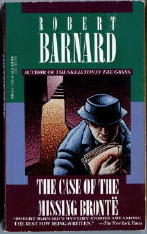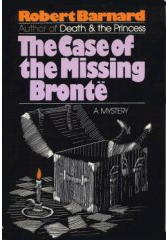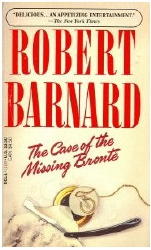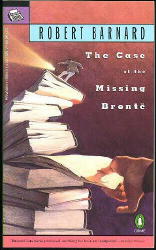Sat 16 Jun 2007
Review: ROBERT BARNARD – The Case of the Missing Brontë
Posted by Steve under Authors , Characters , Crime Fiction IV , ReviewsNo Comments
ROBERT BARNARD – The Case of the Missing Brontë
Dell 11108; paperback reprint, May 1989. Hardcover edition: Scribner’s, 1983. Previous Dell editions: June 1984; 1986. Penguin, paperback, November 1994. First published in the UK: Collins Crime Club, 1983, as The Missing Brontë.

This was – I have a confession to make – my first reading of a Robert Barnard mystery novel. I don’t know why that should be so. I just never read one before. But at a library sale not too long ago, and I got there late, mind you, and in the mystery section of the paperback tent were, lined up all in a row, about a dozen of his books. I couldn’t resist. I grabbed them all, and this is one of them.
Not knowing what to expect, it’s difficult to suggest that I was disappointed, because I wasn’t, but it (um) wasn’t exactly what I expected. I had the strong sense that Barnard’s books are filled with an understated British humor, and in that regard I was right. But I also expected more detection (or deduction, to choose the right word, which never hurts) than there is in The Case of the Missing Brontë. There may be detection on the part of Scotland Yard Superintendent Perry Trethowan, but I think that his wife Jan may have done more of the deducing in this book than does Perry, she having taken an interest in the case even though having never read one of the Brontë books before –
I’ll start at the beginning, which is very, very funny, with the Trethowan family (one son) on a short summer holiday and stopping for a short respite in a small Yorkshire village, in which mother and father meet an old woman in a pub with a story: a find that she had made in some old family papers.
Could it be the manuscript of a never-published Emily Brontë novel? The Trethowans are quickly convinced, but so are other members of Miss Edith Wing’s family (distant relatives) and assorted thugs and academics – don’t be concerned; it’s easy to tell them apart, most of the time. The academics are simply thuggish in more refined ways.
When Edith Wing is knocked on the head and the papers stolen, Trethowan has a case on his hands officially, but why Scotland Yard allows such a leisurely investigation to occur on such a minor matter is a (shall we say) a mystery. But we (the reader) are thankful that they do, as the resulting novel is small marvel of small town japery and incisive cultural commentary, British style, through and through.

A few quotes will suffice to illustrate, perhaps. From page 38. Perry is interrogating the Reverend Amos Macklehose, the aforementioned distant cousin:
“No, indeed. Indeed, no. A harmless spinster lady, and a true friend and kind nurse in time of distress. Who could find a motive for violence in the blameless life of such a one? You must look to th violence of the age, Superintendent. The inborn seed of wrath. Only last night on television – our Tabernacle congregation has after much heart-searching and prayer come to the conclusion that there is no intrinsic reason why television should not be regarded as one of the Gifts of God –”
“Really? I can think of any number.”
Or from page 95, Perry again:
Not that I would have been likely to get much out of any further overheard conversation. Eavesdropping on a foreign conversation is a bit like observing the sex life of earwigs – a lot’s going on, but you don’t get the point of it at all.

Barnard, I have neglected to say, has written a large number of mystery novels, most of them, I feel somewhat able to say, very much like this one, or at least I suspect so. Some of them are standalone thrillers, while others have other series characters other than Trethowan, with occasional instances of crossovers by the characters between them. Here are the ones in which the latter appears, thanks to Al Hubin’s Crime Fiction IV, the point being that I hope to be reading another one soon. Listed chronologically:
TRETHOWAN, INSP. PERRY
o Sheer Torture (n.) Collins 1981 [US: Death by Sheer Torture]
o Death and the Princess (n.) Collins 1982 [US: The Cherry Blossom Corpse]
o The Missing Brontë (n.) Collins 1983 [US: The Case of the Missing Brontë]
o Bodies (n.) Collins 1986
o Death in Purple Prose (n.) Collins 1987 [US: The Cherry Blossom Corpse]
